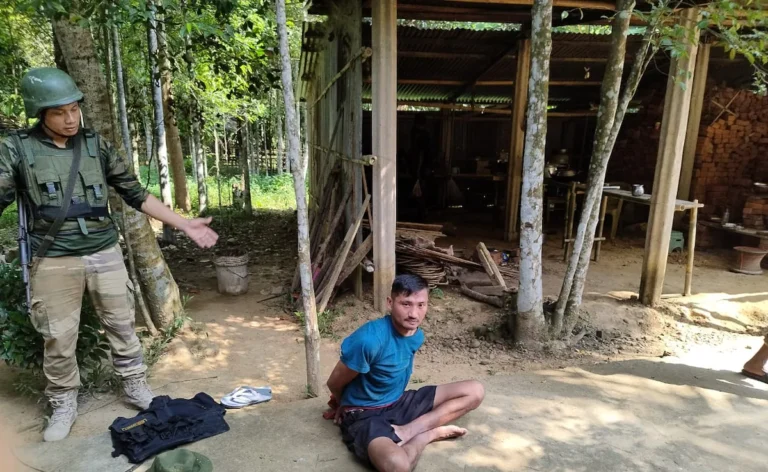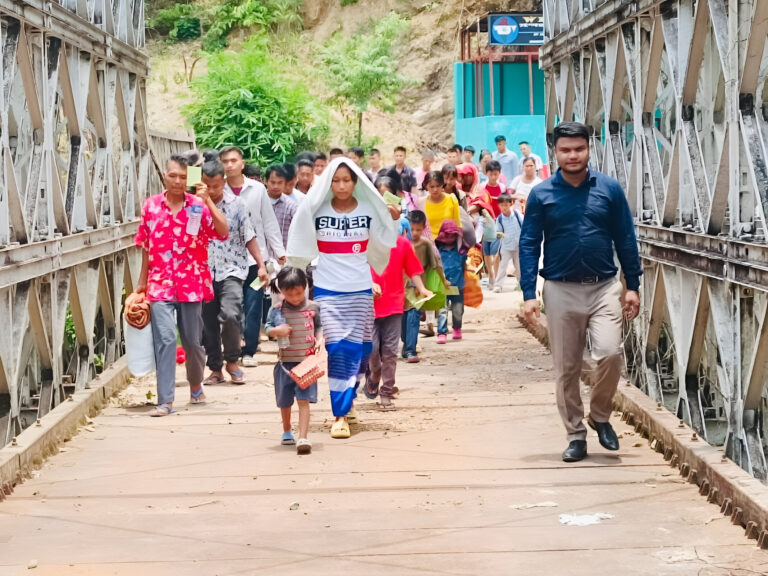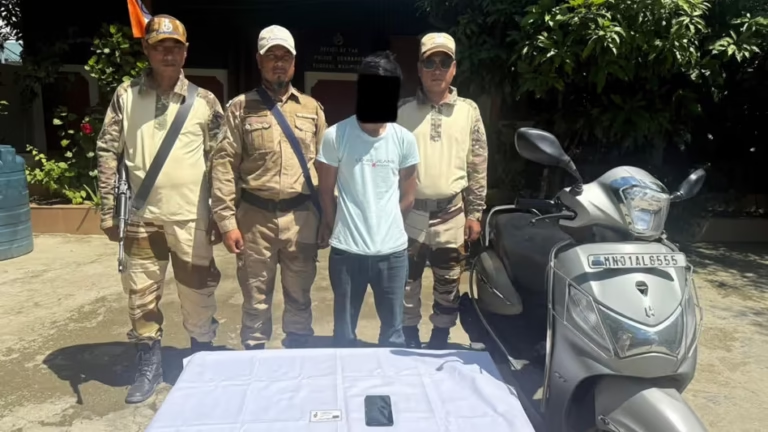Congress Opposes President’s Rule, Calls for Elected Government in Manipur: A Deep Dive into Political Dynamics
Summary
In a bold political move, the Congress party has firmly opposed the imposition of President’s Rule in Manipur, calling instead for a return to an elected government. This stance highlights the party’s deep concerns about democratic erosion and underscores their commitment to ensuring that governance remains in the hands of those elected by the people. The declaration comes amid a backdrop of political uncertainty, sparking vigorous debates on the future of democracy in Manipur.
In-Depth Article
Introduction
Have you ever wondered what happens when the voice of democracy is sidelined in favor of central authority? In Manipur, a significant political debate is unfolding that touches the very core of democratic governance. The Congress party has recently made headlines by opposing the imposition of President’s Rule in the state. Instead, they are advocating for an elected government that truly represents the people’s aspirations and addresses local issues head-on.
This article will take you on a detailed journey through the intricacies of this political development. We’ll discuss what President’s Rule really means, why the Congress party is vehemently against it, and what the call for an elected government signifies for the future of Manipur. By the end of our deep dive, you’ll have a clearer understanding of how this decision could reshape the political landscape and why it matters not just for Manipur, but for the broader democratic fabric of India.
Understanding President’s Rule
Before we dive deeper into the Congress party’s stance, let’s first unravel the concept of President’s Rule. What exactly is it? In India, President’s Rule is a provision under Article 356 of the Constitution, which allows the central government to take over the administration of a state if the state government is unable to function according to constitutional norms. Essentially, it’s like having an emergency brake in the political system—an intervention meant to restore stability during times of crisis.
Imagine driving a car when suddenly the steering fails; President’s Rule is that emergency mechanism designed to get the vehicle back under control. However, while its intention is to stabilize the situation, the imposition of President’s Rule often sparks heated debates about democratic accountability and the erosion of state autonomy. Critics argue that it sometimes becomes a tool for political maneuvering rather than a genuine measure to restore order.
Historical Context of President’s Rule in Manipur
Manipur, with its rich cultural heritage and diverse populace, has experienced its fair share of political turbulence over the years. President’s Rule has been imposed in the state in the past during times of severe political instability or when the local government could no longer maintain law and order. Each instance has left an indelible mark on the political psyche of the state, often leading to heated debates about the balance between central authority and local self-governance.
Historically, President’s Rule in Manipur has been a double-edged sword. On one side, it has been credited with restoring stability in dire situations; on the other, it has raised concerns over democratic deficits, where the people’s mandate gets overridden by top-down decisions. In many ways, these past experiences set the stage for the current opposition from the Congress party, who argue that the citizens of Manipur deserve a government that is directly accountable to them.
Why Congress Opposes President’s Rule
So, why is the Congress party taking such a firm stance against President’s Rule in Manipur? At its core, the opposition is rooted in a commitment to democratic values. The Congress party believes that an elected government is the cornerstone of a truly representative and responsive political system. They argue that when power is centralized under President’s Rule, it undermines the very essence of local democracy and sidelines the voice of the people.
Think about it this way: when you vote for a leader, you expect that individual to represent your interests, your concerns, and your vision for the future. President’s Rule, by its very nature, interrupts that promise. It replaces locally elected representatives with administrators appointed by the central government. For many, this not only feels like a betrayal of democratic trust but also a step backward in the journey toward self-governance and local empowerment.
Furthermore, the Congress party contends that the imposition of President’s Rule is often politically motivated, used as a convenient tool to dismiss dissent and sideline opposition. This perspective is particularly resonant in Manipur, where the local electorate has a rich history of demanding accountability and transparency from its leaders. By opposing President’s Rule, Congress is not just advocating for a political process—it is standing up for the democratic rights of the people of Manipur.
The Call for an Elected Government: What Does It Mean?
The demand for an elected government is more than just a political slogan; it’s a call for restoring democratic legitimacy and ensuring that governance reflects the will of the people. When you think about democracy, the image that usually comes to mind is that of a government elected by the people, for the people. This is the antithesis of President’s Rule, which places decision-making in the hands of central authorities rather than local representatives.
An elected government is inherently more attuned to the needs and aspirations of the local populace. It creates a system where policies are not imposed from above but are shaped by grassroots demands and regional realities. This approach fosters accountability, as elected officials are directly answerable to their constituents. The Congress party’s call for an elected government is essentially a demand for a return to these fundamental democratic principles.
Moreover, an elected government is better positioned to address the unique challenges faced by Manipur. From economic development to social welfare, local leaders who understand the intricacies of their community are more capable of formulating and implementing policies that resonate with the people. The Congress party’s argument is simple: the future of Manipur should be determined by those who live and breathe its daily realities, not by distant bureaucrats operating under a blanket policy of central control.
Political Implications for Manipur
The opposition to President’s Rule by the Congress party is poised to have significant implications for Manipur’s political landscape. For starters, it reinforces the notion that democratic governance must be preserved at all costs. By advocating for an elected government, the Congress party is setting the stage for a potential shift in power dynamics, one that could redefine the relationship between the state and the central government.
This political move could energize local voters who feel disenchanted with centralized control and are yearning for a more participatory form of governance. It may also prompt other political parties and leaders in Manipur to re-examine their positions on state autonomy and democratic accountability. In an environment where political narratives are continually evolving, such a firm stance by a major political force can trigger a broader rethinking of governance models.
However, this shift is not without its challenges. Implementing an elected government in a state that has experienced intermittent instability is easier said than done. There will undoubtedly be debates about the timing, the processes involved, and whether the current political environment is conducive to free and fair elections. Critics of the Congress party’s stance may argue that the imposition of President’s Rule was necessary to restore order during a period of turmoil. Yet, the call for an elected government suggests that even during challenging times, the long-term health of democracy should not be compromised.
Public Sentiment and Media Perspectives
In today’s media-driven world, every political decision is subject to intense scrutiny and debate. The Congress party’s opposition to President’s Rule has sparked a flurry of reactions from various quarters—political analysts, opposition leaders, and the general public alike. Many citizens of Manipur have expressed their support for the call to return to an elected government, viewing it as a reaffirmation of democratic ideals and local empowerment.
Local media outlets have been abuzz with discussions on this topic, often drawing comparisons with similar situations in other parts of India. The narrative is clear: the people of Manipur are tired of decisions being made without their input, and they yearn for a system that truly reflects their collective voice. The media’s role in this scenario is pivotal, as it not only informs the public but also shapes the discourse around the legitimacy and future of local governance.
The public sentiment appears to be one of cautious optimism. While many are supportive of the idea of an elected government, there is also a recognition of the challenges that lie ahead. Questions abound: Can the state transition smoothly from President’s Rule to an elected system? What measures will be put in place to ensure that the elections are free, fair, and inclusive? These questions are critical, and their answers will play a significant role in determining the future trajectory of Manipur’s political landscape.
Economic and Social Dimensions of Democratic Governance
It’s important to remember that politics is not just about power struggles and governance structures—it directly impacts the daily lives of citizens. An elected government is more likely to focus on local development issues such as infrastructure, education, healthcare, and economic opportunities. In contrast, a regime imposed from above might not always have its finger on the pulse of local needs.
Consider the analogy of a tailor-made suit versus an off-the-rack outfit. An elected government is like a tailor-made suit, designed to fit the unique needs and preferences of its people, whereas a centralized government operating under President’s Rule is akin to an off-the-rack solution that might not offer the perfect fit. The Congress party’s call for an elected government is, therefore, a call for a system that can better address the specific socio-economic challenges faced by the people of Manipur.
From an economic perspective, a stable and democratically elected government can create an environment conducive to growth and development. Local leaders who are intimately familiar with the state’s challenges are better positioned to attract investments, promote local industries, and implement policies that lead to sustainable development. Socially, an elected government fosters a sense of ownership among citizens, as they have a direct stake in the decisions that affect their lives.
The Role of Opposition and Political Accountability
One of the hallmarks of a healthy democracy is robust opposition and political accountability. In the current scenario, the Congress party is playing a critical role as a counterbalance to central interventions like President’s Rule. By opposing such measures, they are essentially advocating for a system where power is distributed, and checks and balances are maintained.
Opposition parties are often seen as the guardians of democracy. They scrutinize decisions made by the ruling government and hold them accountable for their actions. In Manipur, the Congress party’s stance sends a strong message that the people deserve a government that is both responsive and responsible. This move is likely to encourage more open debates and discussions about governance models, potentially paving the way for institutional reforms that reinforce democratic norms.
Challenges Ahead: Transitioning from President’s Rule to Elected Governance
Transitioning from President’s Rule to an elected government is a complex process that involves not just political will but also careful planning and execution. There are several challenges that need to be addressed. First, there is the question of timing. Is the state ready for a full-fledged electoral exercise? What measures will be put in place to ensure that the transition is smooth and that law and order are maintained throughout the process?
Another challenge is ensuring that the elections are genuinely free and fair. In regions where political instability has been a recurring theme, there is always the risk of malpractice or undue influence. The Congress party and other stakeholders will need to work closely with election commissions and local bodies to design an electoral process that is transparent, inclusive, and reflective of the true will of the people.
Furthermore, the shift to elected governance must be accompanied by efforts to build institutional capacity at the local level. This includes training for local officials, the establishment of robust mechanisms for public accountability, and initiatives to ensure that citizens are well-informed about their rights and responsibilities in a democratic setup. Only then can the promise of an elected government translate into tangible improvements in governance and quality of life for the people of Manipur.
Comparative Perspectives: Learning from Other States
While Manipur’s situation is unique, there are valuable lessons to be learned from other states in India and even from other democracies around the world. In many regions, the transition from centralized control to locally elected governments has led to improved governance, better public services, and greater citizen satisfaction. These comparative insights provide a roadmap for Manipur, highlighting both the potential benefits and the pitfalls that must be navigated during such a transition.
For example, states that have successfully transitioned to elected governance often emphasize the importance of dialogue between the central and state governments. They invest in building strong local institutions and ensure that the electoral process is backed by rigorous oversight. These practices not only bolster democratic norms but also instill a sense of confidence among the electorate. The Congress party’s call for an elected government in Manipur can draw on these experiences, advocating for a model that is both inclusive and resilient.
The Broader Implications for Indian Democracy
At its heart, the debate over President’s Rule versus elected government in Manipur is a microcosm of a larger issue facing Indian democracy. India, as the world’s largest democracy, is constantly grappling with the tension between central authority and local autonomy. Decisions made in one state can have far-reaching implications for the national political landscape, influencing debates on federalism, democratic accountability, and governance models.
By taking a firm stand against President’s Rule, the Congress party is not only addressing the situation in Manipur but is also contributing to a broader discourse on the future of democracy in India. Their call for an elected government resonates with the aspirations of millions who believe that true democracy can only flourish when power is decentralized and when the people are given a real voice in the decisions that affect their lives.
Conclusion
To wrap things up, the Congress party’s opposition to President’s Rule in Manipur and its call for an elected government is a landmark moment in the state’s political journey. It is a clarion call for restoring democratic accountability, ensuring that governance remains rooted in local realities, and reinforcing the core values that form the foundation of a vibrant democracy.
This debate is not just about political maneuvering—it is about safeguarding the democratic process and ensuring that every citizen of Manipur has a say in shaping the future of their state. As the discourse unfolds, it is clear that the path ahead will require careful planning, open dialogue, and a steadfast commitment to democratic principles. Whether you are a political enthusiast or a concerned citizen, this development is a reminder that the future of democracy lies in the hands of those who dare to demand accountability, transparency, and true representation.
Only time will tell how this political saga will evolve, but one thing is certain: the call for an elected government in Manipur is more than just a political statement—it is a vision for a future where governance is by the people, for the people.
Frequently Asked Questions (FAQs)
- What is President’s Rule, and why is it controversial in Manipur?
President’s Rule is a constitutional provision that allows the central government to assume control of a state when its government fails to operate according to constitutional norms. It is controversial because it centralizes power and can undermine the local democratic process. - Why does the Congress party oppose President’s Rule in Manipur?
The Congress party believes that President’s Rule bypasses the democratic mandate of the people. They argue that an elected government would be more accountable, better address local issues, and uphold the principles of democracy. - What benefits does an elected government offer over a centrally imposed administration?
An elected government is tailored to local needs, encourages public participation, fosters transparency, and ensures that leaders are directly accountable to their constituents—ultimately promoting sustainable development and social justice. - How might this political stance affect the future of governance in Manipur?
If the call for an elected government gains traction, it could lead to a significant shift towards decentralized power, greater local accountability, and a renewed focus on addressing the unique challenges of Manipur through democratic processes. - What challenges could arise during the transition from President’s Rule to an elected government?
Key challenges include ensuring free and fair elections, maintaining law and order during the transition, building robust local institutions, and managing the expectations of a diverse electorate while balancing central and local interests.



